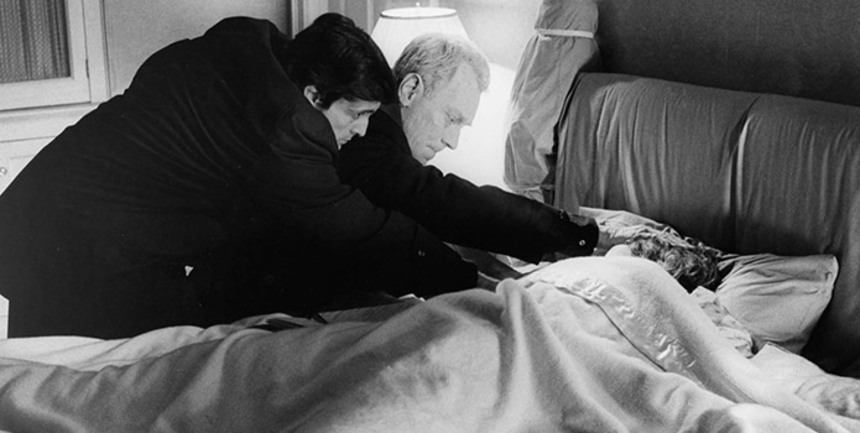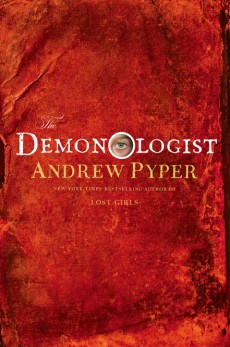In Conversation: Andrew Pyper on the Success and Legacy of THE EXORCIST

In honor of this ghoulish time of year, and The Exorcist currently playing at Toronto's TIFF Bell Lightbox Theatre every night until Halloween, I recently sat down with Andrew Pyper, best-selling Canadian author of the award-winning psychological horror novel The Demonologist (hitting paperback in Canada on January 7th and on March 11th in the US) to talk about his evolving relationship with The Exorcist, how it impacted him as a writer, what makes the movie so effective, and why it deserves to be consistently ranked as one of the scariest movies of all time.
Q: When did you first see The Exorcist?
A: I think I was probably eight years old, which is way too young for anyone to see The Exorcist. I wasn't permitted to but it was at home and it must have been on TV. I went to bed and then snuck back down to watch it over my older brothers' shoulders. I could tell through what was happening on screen - for me, and my brothers who had already seen the entire movie up until that point - that a spell had been cast. I only saw part of it because when they discovered that I was there lurking, they ordered me back to bed. But I saw enough of those initial images to realize that something new had just happened to me, and I thought, "I didn't know movies could do that."
Q: What was your experience like when you finally got to see it in full?
A: I properly rented The Exorcist in my mid-teens, and had those initial impressions confirmed: this was an extraordinary film that took you to an extraordinary place. Up until that point, I'd been on a Godzilla or Fright Night level of thriller and horror. I wasn't working through the canon, but whenever there were late-night horror specials around Halloween, or TV marathons of B-movies, I would devour them. Through that I sort of slowly became more of an amateur connoisseur of the genre. With The Exorcist I realized I had taken the elevator to the penthouse.
Q: How did The Exorcist differ from those B-movies you had experienced?
A: I was impressed by the plausibility of it more than anything else. The horror movies I remember enjoying up until that point never really tried to present characters or situations that you accepted as real. That wasn't even on their agendas.
The Exorcist took its time in terms of pace, the building of character, as well as the sort of odd - by B-movie standards - unnecessary side character developments. We get to understand Chris is an actress, we get to know her director, we see the movie she's working on. Those are things that in a B-movie would be dismissed. "Cut, cut, cut, we don't need that, let's get right to it. We just need to know she's a Mom, she has a daughter, there's a ghoul afoot, bring in the ghoul, you've got about 10 minutes. Let's go."
The Exorcist took the time to build in a level of detail and veracity that I was unused to, so that when the horror starts happening in this very leisurely, incremental way, its believability and reality was never fractured. It wasn't like the demon is introduced and the spell is broken. On the contrary, it made the reality more intense by introducing this supernatural element.
Q: Do you think that plausibility also carries over into the supernatural elements of the film?
A: I think The Exorcist is the finest filmic document we have in arguing that the demonic is real. It's not that it just makes the strongest and most convincing aesthetic case that demons are scary if you allow yourself to imagine them. No. It's saying demons are real. Period. I think it's powerful enough to disrupt the convictions of even the most grounded skeptic.
Q: Is there any scene or moment that you find scariest in that film?
A: The sequences that I find most thrilling are the moments of direct dialogue with the demon. No matter who is addressing it, I find those conversations incredibly involving because it's in those moments that we see that this thing is a cheater, it's a liar, it's unpredictable. It's an animal in that way in that it acts swiftly, intuitively. It has a terrible hunger, which makes it to a degree irrational. But at the same time its intelligent and extremely wily and on that end of the spectrum I find it really interesting. Because it asks you to imagine: if you were to sit on that bedside and engage in a conversation with the thing inside Regan, what would you say, and would you have the strength to hold up one minute talking to that thing? That's a terrifying what if. That's the most terrifying what if.
 Q: What's great about The Exorcist, and your book The Demonologist, is that they both exemplify something I think many great horror narratives do. They emphasize the idea that real horror is not just the supernatural element, but the damaging impact it has on people's lives.
Q: What's great about The Exorcist, and your book The Demonologist, is that they both exemplify something I think many great horror narratives do. They emphasize the idea that real horror is not just the supernatural element, but the damaging impact it has on people's lives. A: The Exorcist is one of the pillars of putting that into practice. You do need an interesting monster and villain, but that has a limit. It really is about the person perceiving the monsters. Horror turns on point of view. We need to know a characters' point of view. We need to feel that we can inhabit that skin, I think even more than in the case of literary fiction. Because when the unreal thing appears if we don't really believe in the characters perceiving it, we're not going to believe the things that they see. It is also about both the veracity of point of view, and the emotional state of the person. Because so often in good horror the point of view is not just neutral. It's not, "I'm just minding my business. Woah! I bumped into a vampire." It's "Well, there's things going on in my life that made the appearance of the vampire logical and even necessary."
Q: With The Exorcist you actually get multiple points of view of people who are coming to terms with what's happening. Does that make the film stand out even more?
A: Because The Exorcist has a cluster of convincing points of view, you turn the prism and you kind of have a different movie with each turn. That's a hard thing to do. It's one thing to pull off a protagonist who you can go on an otherwise unbelievable journey with, but in this movie you have at least three. The demon is single minded with those three. But the way these three particular characters interact with the demon, not only changes them, but actually changes the outcome of the story.
Q: What about your point of view? How has the film changed for you over the years?
A: When I was a younger man I would have seen Father Damian as my way in. I can imagine being on the border of being impatient with Chris. I was probably thinking, "Okay, I know, you have your hands full, you got a troubled kid, but come on, let's get on with it. You're so wrapped up in this, and you're bursting into tears, pull yourself together." Now I would turn first to Chris because I'm a parent now. She's an amazing example of strength and restraint to me under the circumstances. And as a parent, I'd also say that the villain is even more awful than I originally thought. For it to choose a child? What a hideous and unfair choice to make. To have a war over the soul of a child is a demonstration of evil in itself.
Q: The trope of the child in peril is very common in horror film. Why is it such an effective trope? Is it because that's the worst possible thing we can imagine?
A: I think it is among the worst things one can imagine. Especially for a parent to imagine your child in danger you can't grapple with. It's one thing if it's an intruder in the night, and you wake up, and there he is at the end of the wall. But it's even more awful when it's something supernatural like a demon and you don't have the equipment to do battle with it. I also think on a storytelling level, if the threat is to the protagonist alone, and the horror and stakes are, "Will he or she get out of the haunted house, castle, tunnel?" then we're limited. It's a binary choice. Yes, he gets out. No, he didn't get out. A child in jeopardy story by its very structure has greater magnification. Not just for the immediate caretakers, parents, loved ones, guardians, but the child in jeopardy him or herself who is afraid. I think that story also has the virtue of having a child experiencing fear, and they're not equipped to deal with it. Nobody is. But a child least so. And that's an awful thing to contemplate: the meeting of innocence with worldly grown up horror.
Q:. You mentioned before we started the interview that you feel very connected to The Exorcist. In what way has the film impacted on you?
A: It has haunted and stayed with me. It's an aesthetic piece that is among maybe the dozen that I think is a touchstone. It's also an extraordinary work of art that I aspire to in a particular way. It's a work of so called genre filmmaking that is committed to being that. It is among probably the most frightening films ever made. It works on that level. And it works on another level. It's a work of art in terms of it craftsmanship as well as its themes. I'm certainly not claiming I'm there yet, but certainly my aspiration is to do a similar thing -tell a story that corresponds to genre structures that thrills and entertains on a fundamental level, but also does other things that deliver even more than that.
Q: What influence do you think The Exorcist has had on horror fiction? Do you feel the genre changed in some way afterwards?
 A: I think The Exorcist did a couple of things. One, it established at the highest levels of Hollywood studio filmmaking the possibility of psychological horror as a vehicle for a work of art, as well as a massively popular work of fiction. Prior to that I think the preferred treatments of horror would have been the more visceral manifestation of horror: various forms of monsters. The Exorcist opened up new possibilities for far more nuanced, psychological treatments of the villain in horror. Two, it was also able to use the religious mythologies of Christianity as a really fertile - and then often overlooked - source for storytelling. I suspect before that Hollywood was reluctant to go there because it might alienate viewers who might find it offensive. But The Exorcist did it, and did it so well that I think it opened that door to make it okay to use sacred stories, mythologies and beliefs for the purpose of horrifying entertainment.
A: I think The Exorcist did a couple of things. One, it established at the highest levels of Hollywood studio filmmaking the possibility of psychological horror as a vehicle for a work of art, as well as a massively popular work of fiction. Prior to that I think the preferred treatments of horror would have been the more visceral manifestation of horror: various forms of monsters. The Exorcist opened up new possibilities for far more nuanced, psychological treatments of the villain in horror. Two, it was also able to use the religious mythologies of Christianity as a really fertile - and then often overlooked - source for storytelling. I suspect before that Hollywood was reluctant to go there because it might alienate viewers who might find it offensive. But The Exorcist did it, and did it so well that I think it opened that door to make it okay to use sacred stories, mythologies and beliefs for the purpose of horrifying entertainment.Q: Do you think Hollywood would make this film now?
A: If you'd asked me that question as recently as five years ago, maybe I'd say "No." We were in a pretty hopeless place in relation to Hollywood's treatment of horror. I'm more cautious optimistically today. I wouldn't cite any one film in particular, although The Conjuring's huge commercial success has lit a new fire under Hollywood in so far as "Oh yeah, horror, we always knew it was there, but maybe there's doors we haven't opened." And here's my even more optimistic hope: that studio executives realize that "Maybe we've been underselling the audience. Maybe there's a broader, older, crossover audience that we've kind of neglected for a long time."
Q: Do you think the film deserves its reputation as one of the scariest movies of all time?
A: I think The Exorcist is a masterpiece of cinema, a particular masterpiece of horror cinema, and absolutely one of the scariest movies ever made. It's very close, if not number one in my personal canon.
Q: Do you think it will continue to maintain its broader cultural canon status?
A: Someone was telling me a story the other day about being in an airport and there was this kid puking on the floor, and he said "Linda Blair" and laughed. We can say her name as a pop culture joke and laugh, but I think we laugh as we whistle by the graveyard. I think that's testimony to The Exorcist's power. I imagine the entire Western world can say her name and everyone knows exactly who you mean, knows the film you're talking about, knows the images that name evokes. It has a different resonance than saying "Transformers". You say "Linda Blair" and yeah, you can try to treat it as a sort of joke, but there's greater penetration. You pause for just a second and you remember this thing, and it delivers you immediately to this different level. It is, in other words, a myth. The Exorcist is a vibrating, living mythology now.

Do you feel this content is inappropriate or infringes upon your rights? Click here to report it, or see our DMCA policy.






